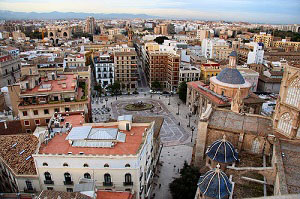
Guide Valencia
Valencia is the perfect getaway for everyone! Who doesn’t love the great Mediterranean climate of Valencia in combination with the most wonderful tourist attractions like monuments, palaces, churches and amazing museums that depict the age-old and rich history of Valencia? Especially in the Old Quarter of Valencia you will encounter enchanting old winding souk-like alleys that remind of Moorish times. But at the same time you will also find here medieval churches and lively markets. Are you in for some more modern attractions, then you should visit the Ciudad de las Artes y Ciencias at the end of the old riverbed of the Turia south of the city. Here you can visit amazing attractions like the Oceanografic. Also in this area you can find the amazing Valencia Bioparc. Or what to think of the great beaches of Valencia? Of course you can also enjoy a terrific nightlife in Valencia, especially in the Carmen district. This awesome Spanish city contains all ingredients for an unforgettable citybreak.
History Valencia
Valencia was founded under the name Valentia Edetanorum by the Roman leader Decimus Junius Brutus Calleicus in 138 BC. Roman temples, a Roman forum and a Roman circus were built around 50 BC. After the decline of the Roman Empire around 400 AD the Roman temples were replaced by Christian buildings and churches and the Visigoths occupied the region. But very soon the Byzantines conquered the southeast of the Iberian Peninsula, including Valencia. The Byzantines were driven away in 625 by the locals.
In 711 the Moors conquered Valencia in a remarkable peaceful way. The city developed into one of the most important cities of the region. In was not until 1093 Rodrigo Diaz de Viver, better known as El Cid, took over the city. He turned the mosques of Valencia into churches and tried to prevent the Arabian Almoravids to take over Valencia. El Cid deceased in 1099 and in 1102 the Almoravids saw their chance to conquer the city. In 1238 the Moors were defeated by James I the Conqueror and Valencia became the capital of the Kingdom of Valencia.
In the 15th century Valencia flourished and became an important economical and cultural centre. The 15th century is therefore called the Golden Age of Valencia. Lots of churches and palaces, such as the Lonja de la Seda, were built. Merchants from all over Europe came to Valencia to buy or sell silk. Also literature came to life with famous writers as Joanot Martorell and Ausiàs March. In 1502 the University of Valencia was founded.
Spanish War
During the Spanish War of Succession (1701- 1714) Valencia choose the side of the Austrian Archduke instead of the Spanish king Felipe V. But the Spanish king won the battle and as a result he abolished Valencia’s autonomous privileges.
In the beginning of the 20th century Valencia again starts to thrive, but the Spanish Civil War (1936-1939) puts an end to this. Valencia became temporarily the capital of the republic but soon the city suffered a lot from the battle between the republicans and Franco’s forces. After Franco’s dead in 1975 the dictatorship in Spain came to an end. The democracy was restored and Valencia was given its autonomous statutes in 1982.
